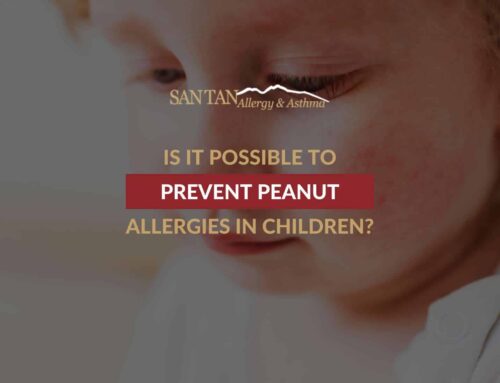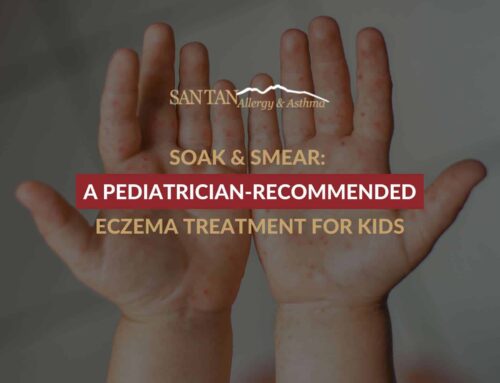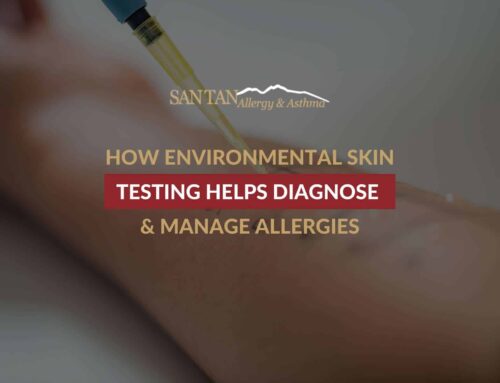Identifying Your Symptoms: Is It Hay Fever Or A Common Cold?
As the seasons change, many people experience symptoms that can be difficult to distinguish between hay fever and a common cold. While both conditions share some similar symptoms, key differences can help you determine which one you might have.
In this article, we delve deeper into the distinctive features of hay fever and the common cold, shedding light on key differentiators and avenues for seeking professional help.

Understanding The Key Differences Between Hay Fever & Common Cold
The similarity in symptoms often leads to confusion, but understanding the nuances between these two conditions is crucial for effective management and relief.
Hay fever, also known as allergic rhinitis, is triggered by your body’s allergic reaction to pollen in the air. As a result, the peak season for hay fever typically coincides with the start of spring in March, when tree pollen counts are highest. During this time, grass and weed pollen counts also tend to rise, making windy and humid days particularly challenging for hay fever sufferers.
In contrast, the common cold is a viral infection that can occur at any time of the year. While it’s not entirely clear why, cold symptoms tend to be more prevalent during the winter months. However, it’s important to note that colds can happen at any time, and it’s not uncommon for people to experience a cold in the spring or summer as well.
Overall, understanding the pollen count and weather patterns can help you prepare for and manage your hay fever symptoms. By being aware of when and how much pollen is in the air, you can take steps to minimize your exposure and reduce your discomfort.
Key Differences
- Onset and Duration:
-
- Hay Fever: Often characterized by sudden symptoms, hay fever tends to be more persistent and can last for weeks or months.
- Common Cold: Symptoms of a common cold usually manifest gradually, with the condition typically resolving within a week to ten days.
- Nature Of Symptoms:
-
- Hay Fever: Predominant symptoms include sneezing, nasal congestion, itchy or watery eyes, and a persistent cough. Hay fever rarely presents with fever.
- Common Cold: Symptoms encompass a broader spectrum, including a sore throat, body aches, and occasionally, a low-grade fever.
- Allergies vs. Viral Infection:
-
- Hay Fever: Rooted in an allergic response, hay fever is triggered by the immune system’s reaction to specific allergens, such as pollen.
- Common Cold: Caused by viral infections, typically rhinoviruses, the common cold spreads through respiratory droplets.
Treatment & Prevention Of Common Cold & Hay Fever: Understanding The Virus & Managing Symptoms
The common cold virus is a highly contagious respiratory infection that spreads through fluid droplets released into the air through coughing and sneezing. These droplets can land on surfaces and objects, infecting others who come into contact with them.
To reduce the spread of the common cold virus, it is essential to practice good hygiene habits, such as:
- Washing your hands frequently: Handwashing is one of the most effective ways to prevent the spread of the common cold virus. Wash your hands with soap and water whenever you cough or sneeze, and make sure to wash your hands after touching surfaces that may have the virus on them.
- Keeping your surroundings germ-free: Regularly cleaning and disinfecting surfaces and objects that are frequently touched, such as doorknobs, light switches, and remote controls, can help reduce the spread of the virus.
- Using a tissue when you sneeze or cough: When you sneeze or cough, use a tissue to cover your mouth and nose. This can help prevent the spread of the virus through airborne droplets.
While there is currently no cure for the common cold, there are several home remedies and over-the-counter medications that can help manage symptoms until they improve. These include:
- Drinking plenty of fluids: Staying hydrated can help thin out mucus and make it easier to breathe.
- Eating a healthy diet: A balanced diet rich in fruits, vegetables, and whole grains can help boost your immune system and fight off the infection.
- Resting: Getting plenty of rest can help your body recover from the infection faster.
- Using over-the-counter painkillers and nasal decongestants: These medications can help relieve a sore throat, reduce fever, and unblock a stuffy nose.
On the other hand, hay fever, also known as allergic rhinitis, is an allergic reaction to airborne particles such as pollen, dust, and mold. Unlike the common cold, hay fever cannot be caught by another person, and it is not contagious. However, it can cause similar symptoms such as sneezing, congestion, and itchy eyes. To manage hay fever symptoms, you can try the following:
- Over-the-counter antihistamines: These medications can help reduce the production of histamine in your body, which can help alleviate symptoms such as sneezing, congestion, and itchy eyes.
- Nasal decongestants: These medications can help unblock a stuffy nose and improve breathing.
While there is no cure for hay fever, there are several effective treatments available that can help manage symptoms and improve quality of life. It is important to practice good hygiene habits to reduce the common cold virus, as well as consult with a healthcare professional to determine the best treatment plan for you.
Expert Tips For Finding Relief From Allergy & Cold Symptoms
It is paramount to seek the best option for what you need. The common cold and hay fever are two different conditions that can cause similar symptoms. While the common cold is a viral infection that can be contagious, hay fever is an allergic reaction to airborne particles.
Do you have a problem with hay fever or common cold? Haven’t found an answer? Look no further with San Tan Allergy & Asthma. Our group of professionals will ensure you get the best treatment for your condition and you’ll be feeling better in no time. Contact us to schedule your appointment and get started on your journey to better health!

San Tan Allergy & Asthma
4915 E Baseline Rd #112
Gilbert, AZ 85234
Phone: 480-626-6600
Email: officemanager@santanallergy.com
Website: https://santanallergy.com/







